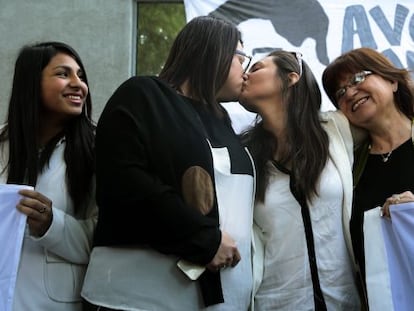Gibraltar puts same-sex marriage bill before Parliament
Popular consultation and main parties suggest support for gay rights in British Overseas Territory


Gibraltar took a decisive step toward recognizing same-sex marriage on Monday when its government announced a draft bill to modify the British Overseas Territory’s Civil Marriage Act. The bill will now go before parliament, which will approve the change to the law in six-weeks, as required by the Constitution.
The draft bill follows a popular consultation carried out in December 2015, the Gibraltar Socialist Labour Party and Liberal coalition on the issue of same-sex marriage.
“After the community showed its overwhelming support, the date for the consultation was extended to allow more people to participate,” says a source in the Gibraltar administration. So far, some 3,490 people have responded to the consultation, out of a total electorate of 24,117.
The draft bill to change the Civil Marriage Act to give people of the same sex the same matrimonial rights as heterosexual couples
The draft bill was due to be presented in June, but the UK’s decision to leave the EU, as well as the electorate’s interest in the issue, delayed the government’s decision.
Chief Minister Fabian Picardo said that the consultation process revealed that Gibraltarians are polarized on the issue of same-sex marriage. “Both sides believe they are right and that the government must support their stance immediately. This delicate issue was so important that I decided to preside over an inter-ministerial committee with the goal of giving careful consideration to all points of view. We have not taken this issue lightly and we have given it the respect it deserves,” he added.
The draft bill to change the Civil Marriage Act to give people of the same sex the same matrimonial rights as heterosexual couples. This was one of the key issues for the Equality Rights Group, which has been fighting for the rights of the LGBT community in Gibraltar.
“It has come very late, there has been a lot of maneuvering, but it’s arrived and we’re grateful,” said Félix Álvarez, president of Gibraltar LGBT.
Álvarez says he will now study the draft bill closely. “We don’t want a legalized apartheid; we want gay rights to be fully incorporated ino the Marriage Act.”
Gibraltar’s opposition Social Democrats said in January it would support legislation in favor of same sex marriage. GSD Daniel Feetham said his party would continue its long-standing policy of allowing members of Parliament a free vote on matters of conscience and that he would defend the right of its members to their own individual opinion. Marriage, he said, is a very important institution 'that binds people who love each other together' and all GSD MPs are in favour of the state opening this up to same sex couples.
Sign up for our newsletter
EL PAÍS English Edition has launched a weekly newsletter. Sign up today to receive a selection of our best stories in your inbox every Saturday morning. For full details about how to subscribe, click here
Gibraltar has autonomy over its laws except for foreign policy and defense. The Rock’s decision to modify the Marriage Act comes three years after the United Kingdom approved same-sex marriage in 2013. Until 2010, it was not possible for same-sex couples to live in council-owned property.
Spain introduced same sex-marriage in 2005.
Álavarez says that Gibraltar’s delays in recognizing gay rights is in part due to “historical” reasons. “The closed border with Spain during the Franco years perhaps closed us off to the advances being made in the rest of Europe,” he said.
In 2014, Gibraltar allowed same-sex civil partnerships, but that do not provide couples with the same rights as under marriage.
English version by Nick Lyne.
Tu suscripción se está usando en otro dispositivo
¿Quieres añadir otro usuario a tu suscripción?
Si continúas leyendo en este dispositivo, no se podrá leer en el otro.
FlechaTu suscripción se está usando en otro dispositivo y solo puedes acceder a EL PAÍS desde un dispositivo a la vez.
Si quieres compartir tu cuenta, cambia tu suscripción a la modalidad Premium, así podrás añadir otro usuario. Cada uno accederá con su propia cuenta de email, lo que os permitirá personalizar vuestra experiencia en EL PAÍS.
En el caso de no saber quién está usando tu cuenta, te recomendamos cambiar tu contraseña aquí.
Si decides continuar compartiendo tu cuenta, este mensaje se mostrará en tu dispositivo y en el de la otra persona que está usando tu cuenta de forma indefinida, afectando a tu experiencia de lectura. Puedes consultar aquí los términos y condiciones de la suscripción digital.










































